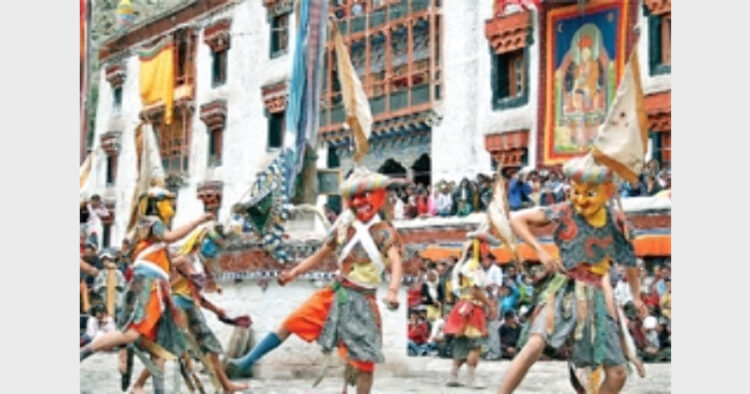Intro: Ladakhi culture is heavily influenced by Tibetan culture. In the unlikely 'Land of High Passes', aggressive construction activities and rise in population is changing its original culture, its agriculture, handicrafts and tourism.
Nestled in the snow covered mountains and clouds, Ladakh has interesting history, myths and mysteries. The history of Ladakh dates back to the Indus Valley Civilisation as Leh was once the part of the Indus Valley Civilisation. Ladakh was ruled by the powerful Hindu and the Buddhist kings who repelled Muslim invasion from Central Asia till the end of the 13th century AD. In the 1st century AD, Ladakh was part of the Kusana Empire. Its rich spiritual, cultural and military history from the 1st century AD to the 10th century AD is shrouded in mystery. Situated between Kunkun Mountain Range and the great Himalayas at an average altitude of 15,000 feet, Ladakh is not only a tourist paradise but it preserves a sustainable economic development model which is enshrined in nature. Over the years, the hill paradise has witnessed environmental degradation, loss of flora and fauna, unplanned growth, migration of people from village to urban centers and the disappearance of its exotic handicraft tradition.
Ladakhi people at higher altitude rear pashmina goats. They sell wool from pashmina goats to the agents of the Chinese, to European and Indian traders at throw away price. The wool is sent to Europe and China for high value addition. A pashmina shawl or a scarf carries a huge price tag in international craft bazars. The government should ensure the value addition to raw wool is made by the local Ladakhis in Ladakh itself. The job to revive the craft traditions should be assigned to local bodies, monasteries or genuinely good NGOs instead of any government agencies who often overlook the interest of original artisans and serve the interest of traders, middlemen and rich people. There is need for people’s participation in their own development. Ladakh lost 27,000 pashmina goats in 2012-13 due to extreme cold. Had the State government provided shelter to pashmina goats this tragedy would not have taken place. Ladakhis have the skill to make exotic ‘thangka’ paintings which are very popular in international craft bazaars. Besides, the Ladakhi artisans make masks from wood and paper pulps, a wide range of metal crafts and religious artifacts which have utility and decorative value. Unfortunately, many factory made artifacts from China and UP have flooded the market. This has resulted into the disappearance of exotic hand crafted items. The magnificent papier mache and wood work of Ladakh have almost disappeared. Many priceless artifacts from Buddhist monasteries have been smuggled out. In many places genuine artifacts have been replaced with fake artifacts. The original handmade Ladakhi woolen garments are no longer produced by Ladakhis. Mill made winter wires from China and Punjab have replaced the original Ladakhi products. Over the years the Leh market has become the dumping ground for the cheap Chinese products.
Ladakh has a vibrant agriculture sector which produces a wide range of foodgrains, vegetables and fruits. Farmers grow barley, wheat, special kind of golden delicious apple, pears and apricot abundantly. But Ladakh’s food sufficient economy is at the decline which cannot be addressed with financial package but with people’s participation in their own development. High agriculture input cost, non-availability agriculture labour, depletion of ground water, moisture loss in soil; climate change and societal behavior change for urban life with consumer comfort pose a serious threat to Ladakhi economy and culture. “Twenty years back there was no water scarcity in Ladakh. Today water scarcity is looming large,” said Sonam Wangyal, 77, a mountaineer from Leh. Ladakh gets migrant labors from Kashmir, Nepal and Bihar who work in hotels, agriculture field and for road construction companies. Many of them do not return to their native places and settle down in Ladakh. Tourists throw empty food packets and plastic water bottles which have polluted the environment. Water pollution is the main reason why tourists buy plastic drinking water bottles. “The automobile pollution is so high that the white snow always carries brown stains,” said Wangyal. Every Sunday, Sonam with a group of volunteers spend a few hours to clean the roads and drains in Leh. But the root cause of unclean environment lies somewhere else. The population is growing fast and nobody bothers to clean the place. The hill slopes around Leh are being sold for real estate development which may invite another man made environment disaster. Aggressive construction activities and rise in population has increased the temperature. The demographic change which is happening fast in Ladakh may outnumber the Buddhist population and its culture within a short period. Unless the demographic change is nipped in the bud it may crop up so many economic and social problems in near future. The solution lies in controlling population and keeping a tag on migrant labors. There is an urgent need to protect and preserve Ladakh’s original culture and its self-sustainable village economy which coheres around agriculture, handicrafts and tourism.
Sudhansu R Das (The writer is a freelance Journalist who recently visited Ladakh extensively to study Society and Culture)














Comments